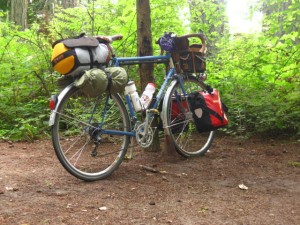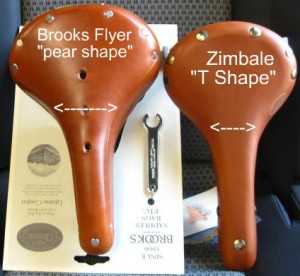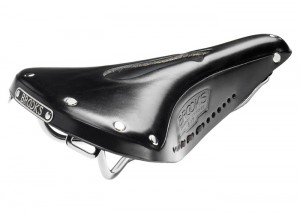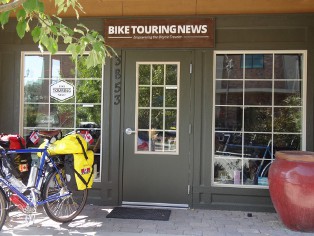Just what is the best saddle for touring??? Drum Roll, please. The best saddle for touring is the saddle that fits your behind and allows you to ride in comfort!!
Okay maybe that wasn’t the answer you were looking for, but it is the best we have to offer. No two people are shaped the same therefore no one saddle is going to be the end all saddle for every person.
The Bike Hermit used to tour on a Brooks B17, as to be expected, over time the saddle relaxed and had a bit of “splay” He punched holes in the sides (like the Brooks Imperial) and threaded the saddle with leather (from the Tandy leather store) and that solved the problem. About two years ago he switched to a Gilles Berthoud Aspin. This saddle was stiffer in the beginning and now has molded to his shape just perfectly. He easily has 3,000 miles on that saddle with no issues. Aha, you say, I will go research and purchase a Gilles Berthoud. Well, Sky King did her best to love the Gilles Berthoud Aspin spending hours adjusting height, position, angle etc but was never comfortable. Finally she measured her sit bones and realized between the shape and width of the Gilles Berthoud Aspin, it was never going to work for her. She went back to her older Fizik’s vitesse tri and problem solved. She is back to all day, day after day saddle comfort. She does plan to try the Brooks B17 Narrow as she misses not being able to carry her Zimbale 7 liter saddlebag but for now the Fizik’s Vitesse Tri is just fine.
Here are some very important things to consider when selecting a Saddle.
Shape:
Your shape and the saddle shape need to be happy. Most Saddles tend to be either a pear shape or a t-shape. The Gilles Berthoud Aspin & the Brooks B17, The Brooks Flyer fall into the pear shape category, the Brooks Swallow, the Zimbale leather saddle, the Brooks B17 Narrow, the Fizik’s Vitesse are considered a T shape.
The width of the saddle across the widest area and how quickly it widens from the nose to the back will affect saddle comfort. Add to that the saddle position or the saddle tilt (nose down, nose up, nose level). Of course don’t forget to factor in the entire bike fit (see earlier posts)
Too Much Pear-Shape for your shape typically causes chafing in the inner neighborhood of the lower fold of the buttock, top-of-the-leg, panty line, hamstring attachment (however you want to describe it) because the saddle is too pear-shaped for the motion of your hip joints. If these are issues you have with your saddle, perhaps a T-Shaped style would work better. If you feel like you are sitting on a narrow, painful 2 X 4 a pear shaped saddle could be what you need.
Let’s get back to saddle width and length. The size of your hips or the size of your behind has very little to do with the size of your saddle, wide hips do not mean you need a wider saddle. The width between your “Ischial Tuberosities” ie) sit bones is what matters. Where those sit bones connect with your saddle makes the biggest impact in saddle comfort. Too wide or too narrow for your sit bones and the end result is pain and chafing. Sky King has a wider hip measurement than the Bike Hermit but he has a wider sit bone measurement.
Each saddle has “cheeks” on the wide back part. Sometimes the cheeks are even domed up a bit. Your sit bones are meant to land in the high part of that dome to take advantage of the padding and the overall architecture of the saddle. Saddle without domes still have a cheek area, the widest part of the saddle is where your sit bones should be resting. Measure the saddle from center of cheek to center of cheek. The saddle’s center-to-center should match the center to center measurement of your sit bones.
Next measure the saddle’s overall width. Generally the saddle’s overall width should be, at minimum, the same as the outside measurement of your sit bones OR slightly wider but NO more than 2 centimeters wider than the outside sit bone measurement. You want to be able to shift around to power up hills or use body-english around corners or just to give your butt a break, and STILL have the bones land on the saddle.
In the case of a many leather saddles your saddle must be about 2 cm wider than your outside sit bone measurement so you do not have bones contacting the metal cantle* plate.
(*rough description – the horseshoe shaped metal plate under the back of the saddle that holds the rails in place)
Measure your sit bones:
We could get all fancy and purchase memory foam or drop some dollars on a fancy gel seat specifically designed to measure sit bones and assist in determining the proper saddle width but we hate to spend money when things at hand will work just as well.
Three inexpensive options for measuring Sit Bones:
The Flour method
Take a gallon size zip lock bag, fill with enough flour for about a two inch flour cushion when the bag is lying on a flat surface. Place this bag on a hard flat surface – table or chair (we use a piano bench) Sit on the bag (preferably bare skin), mimic your bike position. Now stand up without disturbing the bag. Those two dimples/impressions in the flour are from your sit bones.
The Play Dough method
To make your dough:
One part salt, two parts flour, mix with water until it’s right for modeling.
Roll about an inch thick, cover with aluminum foil to keep it from being sticky, place dough w/ foil on a low bench, once again sit on dough (bare skin is best) and lean forward to approximate riding position since the sitbones become more narrow as you lean forward. Remove foil and allow to dry a little. The bones impression will become white first.
The Measurement
Take a millimeter tape measure and measure the impressions, recording your findings.
1. The inside edge to inside edge
2. Center of depression to center of depression, if easier, place a marble in each depression and measure the marbles.
3. Outside edge to outside edge
- Center-to-center measurement correlates with the spot on a saddle that bears the weight of the sit bones. The saddle “cheeks”.
- Outside to outside measurement is a consideration for some types of saddles, such as the Brooks that have metal rails, you do not want to have your sit bones resting on the metal rails. General rule of thumb – your saddle width should be about 2 centimeters wider than outside sit bone measurement. Again, you want your sit bones resting on the “checks” of the saddle and you want some wiggle room for movement as you are touring.
- Inside to inside may be necessary if you plan to use a saddle with a cut out, to ensure the sit bones clear any large center cutout in the saddle. The inside bones falling into the ‘moat’ so to speak, causes a lot of pain in the bones surrounding the “soft tissue” area. To clear the cutout, you need about 20 mm extra space in between the inside distance of the sit bones. So, if the cutout is 60 mm, your inside distance is 80, then you have just enough clearance.
The Hand Method(s) of measuring
Sit on your hands, and feel for the two bones of your butt. They feel like elbows poking down into your hands.
Put the tip of your index fingers right under the part of the bones that is pushing hardest into the chair. (squish the very tip of your fingers between the chair and your sit bones)
Lift your butt from the chair leaving your hands on the chair, and have your assistant measure the distance between your fingertips. This is pretty much your center-to-center.
Then put your fingertips against the outsides of the bones. Push them right into the bones so they are on the outside of the bones. Lift your butt from the chair and have an assistant measure the distance between your fingertips. This is pretty much your outside.
Some people have sit bones that angle a lot from front to back. The “sits” are heavy thickened portions of the rami area of the pelvis and can have unique personalities of their own. You can measure again on the forward part of the heavy “elbow” bit if you can feel that yours have a definite angle. The forward portion of the heavy thick part of the bone is what your weight rests on more when you are in a more aero position. DON’T measure the thin blade like portion that is in your crotch, that is the rami and you do not want a saddle there. Measure from your backside.
Repeat your measurements a few times, average them out if you want.
You can also get these measurements by lying on your back with your knees to your chest holding a measuring tape and poking around for landmarks.
The Cutout
Purchasing a saddle with a cut out can be beneficial if you have soft tissue pressure. An easy way to help determine if you might be a good candidate is to sit (commando or in thin underwear)on a very hard surface, feet flat on the floor, pedaling distance apart. Lean forward from the hips, keeping your back straight and place your elbows on your knees. If you soft tissue is feeling overly squished you may want to try a saddle with a cut out. Do some forum research, some people love them, other’s find the edges of the cut out equally irritating. Assuming you have a good bike fit and proper saddle height, consider adjusting the angle of your current saddle as well to see if that relieves soft tissue pressure.
Length
Years ago some saddle manufacturers started adding a short version to their line. Historically the short version came about for women riding in skirts and dresses, the longer nose would catch on the dress, making mounting and dismounting more challenging. Now a short version is more about personal comfort. Reading Forums and blog post about saddle fit there are numerous opinions about both. Sky King’s Fizik Vitesse Tri is a “woman’s” saddle but it isn’t any shorter in the nose than a Brooks Swallow.
Conclusion
We agree that finding the right saddle can be tough. Sometimes despite the best research, trial and error ends up being the answer. Taking your measurements and understanding your riding style are the beginning of your quest.
For more great info on choosing a Saddle read other blogs and forums. Sky King took the measuring suggestions from posts on the Team Estrogen Forum. Great resources can be found on sheldonbrown.com, team estrogen forums, bike forums (touring). Most of all don’t be afraid to ask questions. We both ride day in day out without saddle pain on two entirely different saddles.




Jon Black February 23, 2016, 5:32 pm
A Selle Anatomica. Leather, made in the USA. Perfect for long tours.
Bike Hermit® February 23, 2016, 6:07 pm
Jon,
I had a Selle Anatomica Titanico which was comfortable until the nose piece broke. When I contacted Selle Anatomica about a replacement they wanted to charge me since the saddle was an “old model”, even though I had been a dealer in the past. They sell saddles direct to consumers and are always competing with their dealers by deeply discounting their own products. I don’t sell them or use them anymore.
Nick Kovacs August 25, 2016, 7:33 pm
Both my wife and I bought Selle saddles. She loves hers, I thought mine was some type of Viking torture device. She rides hers daily, mine went back under their 30 day return policy….each to their own.